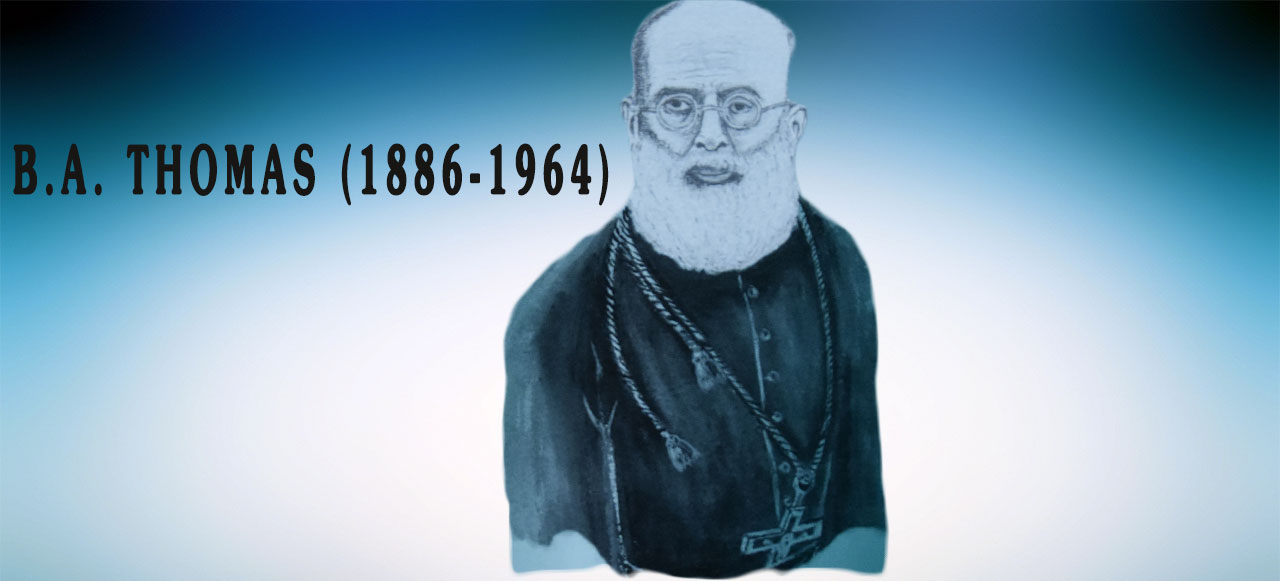Biography
Father B. A. Thomas was born on March 7, 1886, in Padiyanthalvu, a village near Jaffna, Sri Lanka. His parents named him Bastiampillai Anthonipillai. Having completed his primary studies, he went on to St. Patrick’s College in Jaffna, run by the Missionary Oblates of Mary Immaculate. In 1903, he brilliantly passed his exams.
In 1904 he continued his studies at St. Martin´s Seminary in Jaffna. Because of his delicate health and his constant dependence on doctors and pharmacies, he had given up the idea of priesthood. But one day, in Sacred Scripture class, the professor was explaining the urgency of the fundamental call of Jesus: “If someone wants to come after me, he must deny his very self, take up his cross and follow me.” (Matt 16:24) These words were decisive. He mustered all his strength and, moving straight ahead, overcame all obstacles to the priesthood.
Along with other Oblate candidates, he left for Colombo to begin the novitiate in 1907. In the Scholasticate, aware of his limitations which kept him from physical work, he gave himself fully to his studies. Because of his great intelligence and his dedication to study, his classmates in the seminary called him “The Philosopher.” Fr. Louis Coquil, O.M.I. (1856-1928), his professor, recognizing his profound understanding of Thomism, with great acumen referred to him with the name of the Angelic Doctor: Bastiampillai Anthonipillai would be called “Thomas” from then on. Later on, the name “B. A. Thomas” became his official name, and was even used in his passport.
Fr. B. A. Thomas was ordained on January 6, 1912. Because he was still in fragile physical health, he was sent to St. Patrick’s College. The superiors put him in charge of the Hindu Residence. Since he had studied Hindu writings and Hindu classics, he started some serious dialogue with his Hindu students. Some of them later embraced the Catholic faith. Some even became priests.
In 1924, Pius XI, the Pope of the Missions, published the encyclical Rerum Ecclesiae. In it, he asks missionary bishops to set up contemplative communities in mission countries. Bishop Alfred Guyomard, O.M.I. (1884-1956), Bishop of Jaffna, aware of Fr. B. A. Thomas´ gifts and his knowledge of western monasticism, urged him to plant the contemplative life in Sri Lanka. Fr. B. A. Thomas founded a congregation of local monks, the Rosarians, the first indigenous community of contemplative monks to be established in Asia. The Institute was canonically erected in 1934. In 1948, after three failed attempts, the female branch of the Rosarians was born. Both groups would come to establish several Christian monasteries on the island, as well as in India. Fr. B. A. Thomas established, in the Rosarian monasteries, a contemplative, ascetic life, carried out in an indigenous culture: rigorous penitential fasting 365 days per year (this would later be reduced), a strictly vegetarian diet to serve as a link with the Hindus and Buddhists, choral Hindu-style chant in place of the classical Gregorian chant, work shared with the local people to support them and help them. All of this was done with the utmost respect for the rich traditions of the local culture. Fr. B. A. Thomas himself was the model of this life: He slept barely two to three hours a day. The three abuses he hoped to correct were: 1) the dominant materialism, 2) the repressive poverty of the majority as a consequence of the unjust distribution of goods, and 3) the injustice in the traditional caste system. He admitted candidates from all castes with no distinction, expecting all to live and to serve, driven solely by the charity of Christ. In spite of the strong opposition he met from both outside and within the Church itself, he held firm in his decision, and he insisted that the topic of castes not even be mentioned in the community.
Towards the end of his life, his broken health often put him in the hospital. Therefore, his superiors decided to remove Fr. B. A. Thomas from the monastic life so that he could pass his final days at the bishop’s house in Jaffna, in the company of his brother Oblates. On January 26, 1964, he died. Shortly before he died, he received a visit from the Superior General of the Oblates, Fr. Léo Deschâtelets (1899-1974). Upon his return to Rome, Fr. General said: “If you want to see a true saint, you should go to Jaffna. You will find in that old man everything that the word ‘holiness’ implies. Everything about him corresponds to the idea we have of a man of God.”
